In addition to diet and exercise, to reduce risk of MACE (cardiovascular death, non-fatal myocardial infarction, or non-fatal stroke) in adults with established CVD and either overweight or obesity, and for chronic weight management in patients with obesity ≥12 years and adults with overweight with at least one weight-related comorbidity. Click for Limitations of Use.
Efficacy & Safety
Wegovy® and MACE Risk Reduction
In the SELECT CVOT, in adults with established CVD and either obesity or overweight, without diabetes, when added to CV standard of care
Study Design
In adults with established CVD and either obesity or overweight, without diabetes, when added to CV standard of care,
A landmark study: The largest CVOT ever completed for patients with obesity and established CVD1-3
Patient population
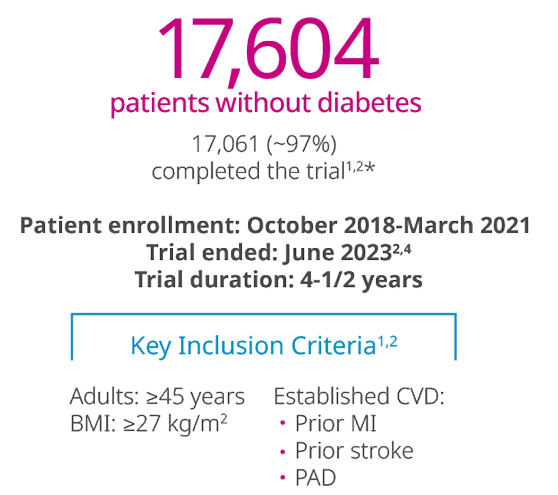
Treatment arms
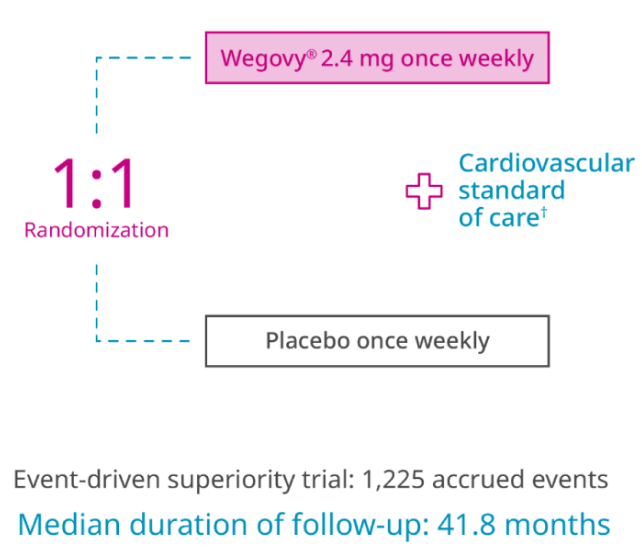
Primary composite end point
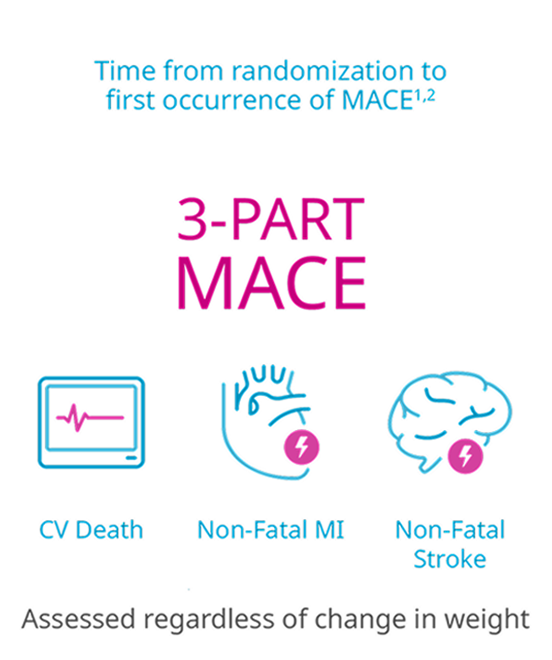
*Defined as having died or attended the final trial visit.
†Standard of care included CV risk factor management and individualized healthy lifestyle counseling (including diet and physical activity).
BMI, body mass index; CV, cardiovascular; CVD, cardiovascular disease; CVOT, cardiovascular outcomes trial; MACE, major adverse cardiovascular events; MI, myocardial infarction; PAD, peripheral arterial disease.
CV Standard of Care
In adults with established CVD and either obesity or overweight, without diabetes, when added to CV standard of care,
MACE risk reduction was evaluated on top of CV standard of care‡
During the trial, medical treatment and individualized healthy lifestyle counseling were utilized to manage CV risk factors1
CV standard-of-care treatments at baseline included‡:
Medication Class
Percentage of Patients (N=17,604)
Lipid-lowering therapy
90%
Platelet aggregation inhibitors
86%
Angiotensin-converting enzyme inhibitors or angiotensin II receptor blockers
74%
Beta-blockers
70%
Throughout the trial, CV therapies could be adjusted at investigator discretion according to current standard of care1
Baseline cardiometabolic parameters1
Wegovy®
(n=8,803)
Placebo
(n=8,801)
Heart rate
69 bpm
69 bpm
A1c
5.8%
5.8%
Systolic blood pressure
131 mm Hg
131 mm Hg
Diastolic blood pressure
79 mm Hg
79 mm Hg
Triglycerides
138.6 mg/dL
139.5 mg/dL
Total cholesterol
155.5 mg/dL
156 mg/dL
LDL cholesterol
78.5 mg/dL
78.5 mg/dL
HDL cholesterol
44.1 mg/dL
44.2 mg/dL
‡Not a comprehensive list.
A1c, glycated hemoglobin; bpm, beats per minute; HDL, high-density lipoprotein; LDL, low-density lipoprotein.
MACE Risk Reduction
In adults with established CVD and either obesity or overweight, without diabetes, when added to CV standard of care,
Wegovy® is the only obesity medicine approved to help prevent life-threatening CV events1,2,4
Cardiovascular disease is the #1 cause of death for adults with obesity5
Primary composite end point: Time to first occurrence of MACE (CV death, non-fatal MI, or non-fatal stroke)1,2
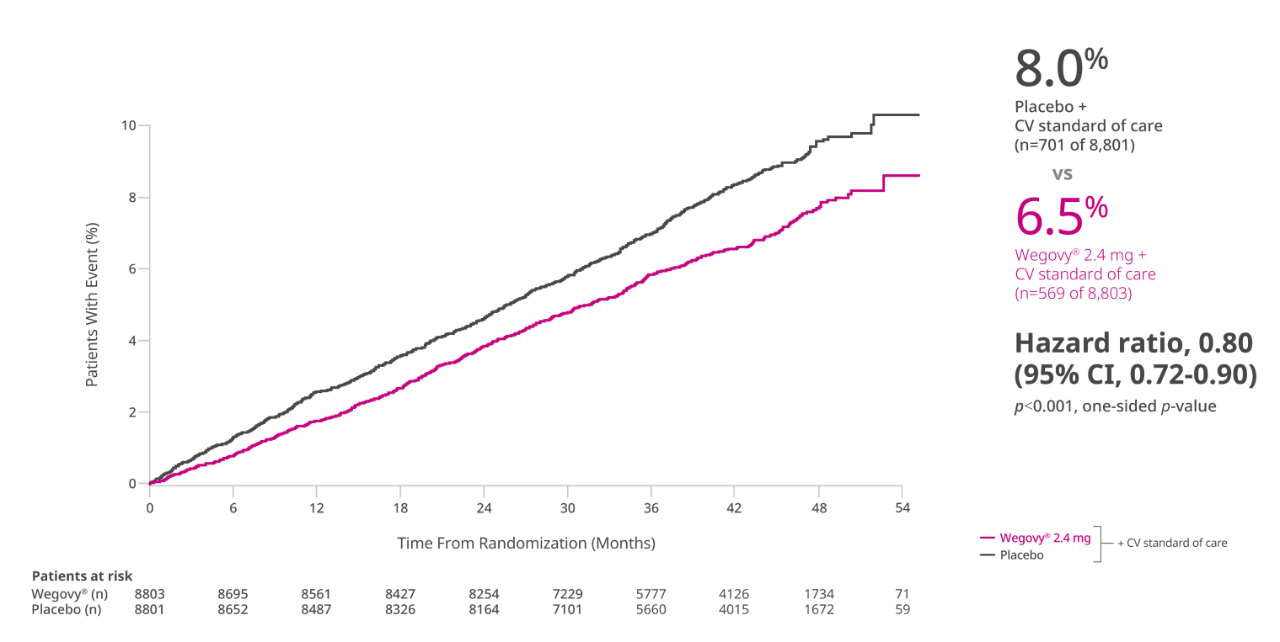
The exact mechanism of cardiovascular risk reduction of Wegovy® has not been established.
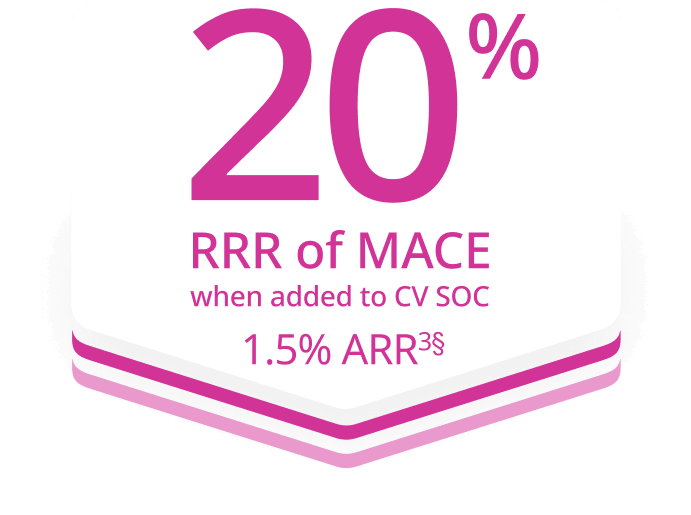
With Wegovy®
the reduction of MACE was not impacted by age, sex, race, ethnicity, BMI at baseline, or level of renal function impairment.
SELECT: Event-driven CVOT of 17,604 adults with obesity or overweight and established CVD (prior MI, prior stroke, or PAD) assessing superiority of Wegovy® 2.4 mg vs placebo (1:1 randomization) for time to first MACE. Both groups received standard of care for CV risk reduction. Patients with diabetes were excluded.
§1.5% ARR at 40 months (mean duration of follow-up).
ARR, absolute risk reduction; CI, confidence interval; RRR, relative risk reduction; SOC, standard of care.
Treatment effect for MACE and other events in SELECT1
The effects of semaglutide were directionally similar across end points2
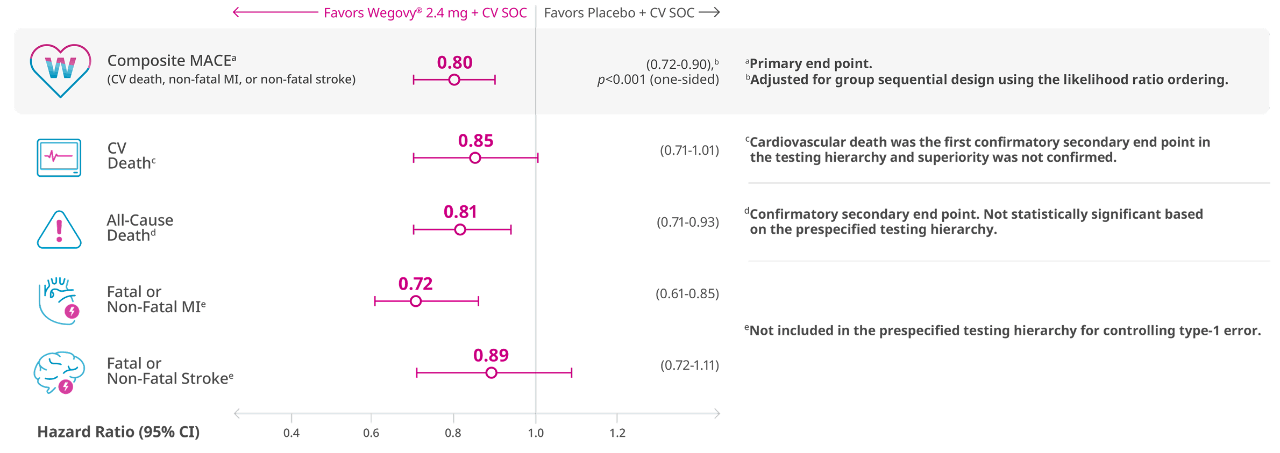
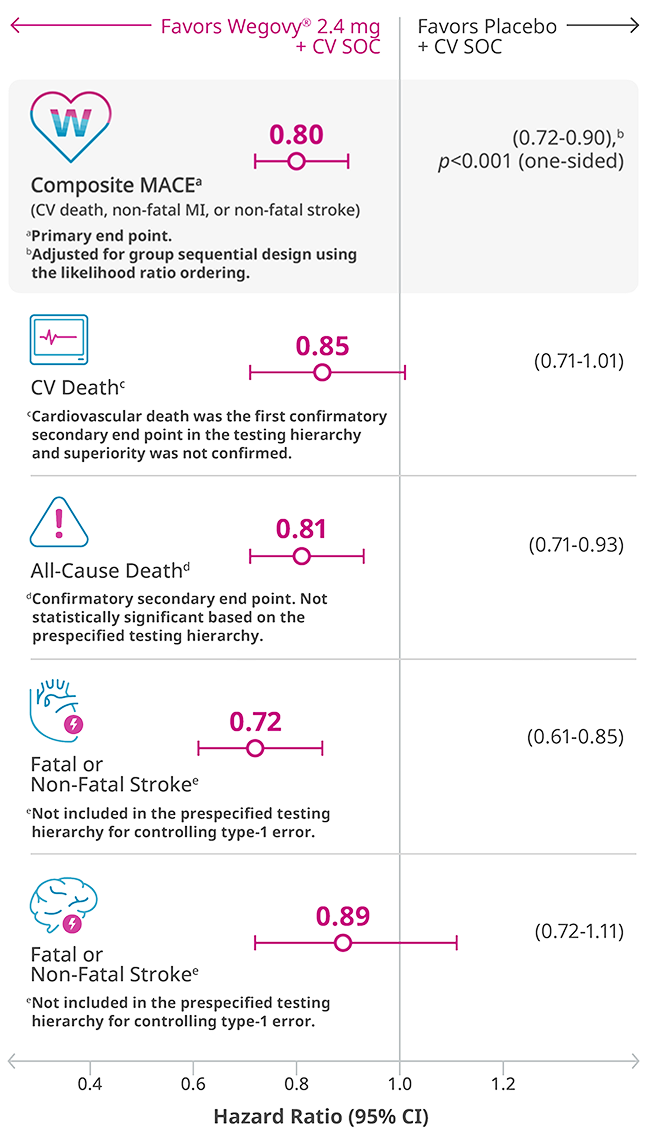
- CV death occurred in 2.5% (223/8,803) of patients on Wegovy® and 3.0% (262/8,801) of patients on placebo
- All-cause death occurred in 4.3% (375/8,803) of patients on Wegovy® and 5.2% (458/8,801) of patients on placebo
- Fatal or non-fatal MI occurred in 2.8% (243/8,803) of patients on Wegovy® and 3.8% (334/8,801) of patients on placebo
- Fatal or non-fatal stroke occurred in 1.8% (160/8,803) of patients on Wegovy® and 2.0% (178/8,801) of patients on placebo
Cardiometabolic Benefits
In adults with established CVD and obesity or overweight, without diabetes, when added to CV standard of care,
Patients taking Wegovy® experienced improvements across most cardiometabolic risk factors1
Supportive secondary end points: Change from baseline to week 104 in:

Lipid Profile:
Total cholesterol
4.6% reduction
1.9% reduction with placebo
LDL
5.3% reduction
3.1% reduction with placebo
HDL
4.9% increase
0.6% increase with placebo
Triglycerides
18.3% reduction
3.2% reduction with placebo

Systolic blood pressure:
3.8 mm Hg reduction
0.5 mm Hg reduction with placebo

Diastolic blood pressure:
1 mm Hg reduction
0.5 mm Hg reduction with placebo

Body weight:
9.4% reduction
0.9% reduction with placebo

Waist circumference:
3-inch reduction
0.4-inch reduction with placebo
Mean baseline body weight: Wegovy®=212.8 lb, placebo=213.4 lb.

Heart rate:
3.8 bpm increase
0.7 bpm increase with placebo

A1c:
0.3% reduction
0% change with placebo
Wegovy® is not indicated to treat hypertension, type 2 diabetes, or dyslipidemia.
Supportive secondary end points were not included in the statistical testing hierarchy and, as such, not controlled for multiplicity.
bpm, beats per minute.
Study design1,2
SELECT: A multi-national, double-blind, placebo-controlled, event-driven CV outcomes trial of 17,604 adults with a BMI ≥27 kg/m2 and established CVD (prior MI, prior stroke, or PAD) designed to assess superiority of once-weekly Wegovy® 2.4 mg vs placebo (1:1 randomization) for time to first MACE. Both groups received current standard of care, including CV risk factor management and individualized healthy lifestyle counseling (including diet and physical activity); concomitant CV therapies could be adjusted, at the discretion of the investigator, to ensure participants were treated according to the current standard of care for patients with established CVD. Patients with a history of type 1 or type 2 diabetes were excluded. Median duration of follow-up was 41.8 months.
Primary composite end point1:
- Time from randomization to first occurrence of a 3-part composite MACE, defined as CV death, non-fatal MI, or non-fatal stroke
Key secondary end points1:
Time from randomization to first occurrence of:
- Cardiovascular death
- All-cause death
Other secondary end points1:
Time from randomization to first occurrence of:
- Fatal or non-fatal myocardial infarction
- Fatal or non-fatal stroke
Relevant supportive secondary end points1:
- Change in body weight from baseline to week 104
- Change in waist circumference from baseline to week 104
- Change in systolic blood pressure from baseline to week 104
- Change in diastolic blood pressure from baseline to week 104
- Change in heart rate from baseline to week 104
- Change in A1c from baseline to week 104
- Change in lipids‖ from baseline to week 104
‖LDL, HDL, triglycerides, and total cholesterol.
Post Hoc Analysis
In adults with established CVD and either obesity or overweight, without diabetes, when added to CV standard of care,
MACE risk reduction observed at 3 months after initiating Wegovy® treatment3
Early reduction in MACE was observed with Wegovy® before clinically meaningful changes in body weight were seen3
Primary composite end point: Time to first occurrence of MACE (CV death, non-fatal MI, or non-fatal stroke)3
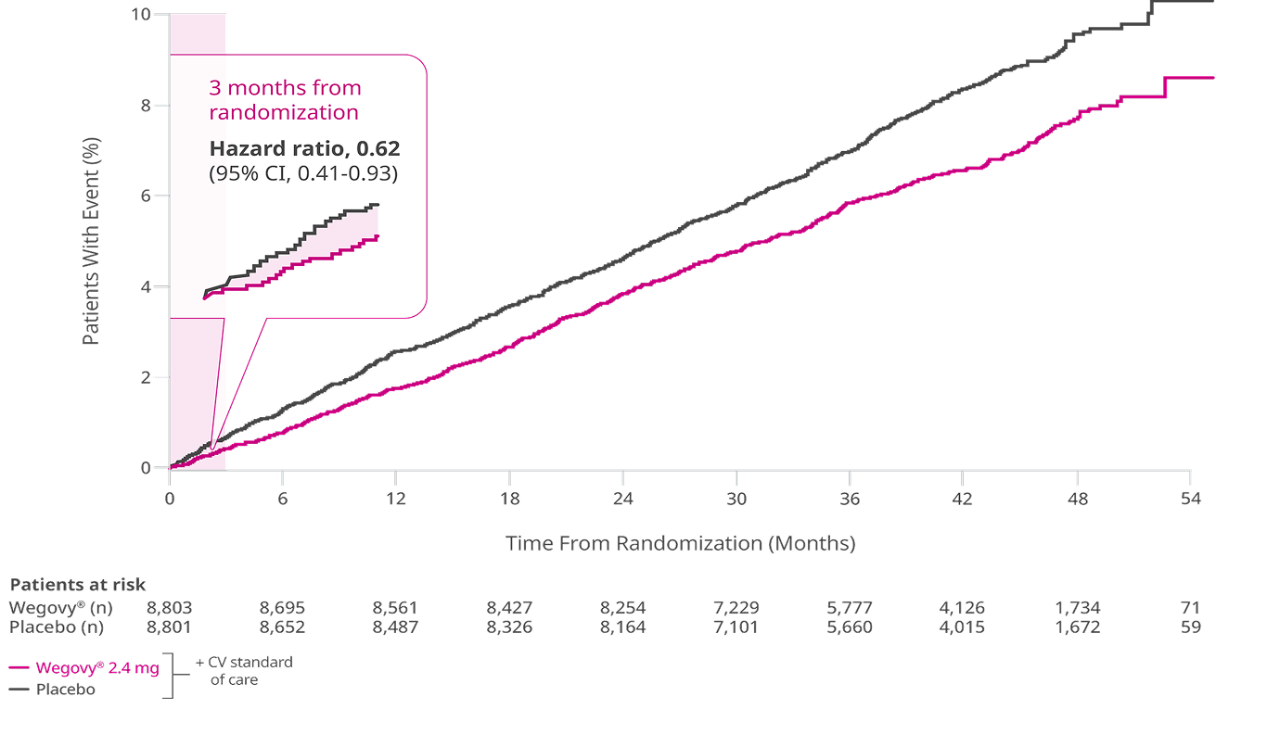
At week 12, estimated mean change in body weight from baseline was -4.1% in the Wegovy® arm and -0.6% in the placebo arm.3
- This post hoc analysis is hypothesis generating only; the clinical validity of these results cannot be determined
- SELECT was not powered for this analysis; Novo Nordisk was responsible for data analysis, and the results are not published
- Further work addressing the mechanisms by which semaglutide produces these early clinical benefits would be of value
Time to first MACE: Incidence over time3
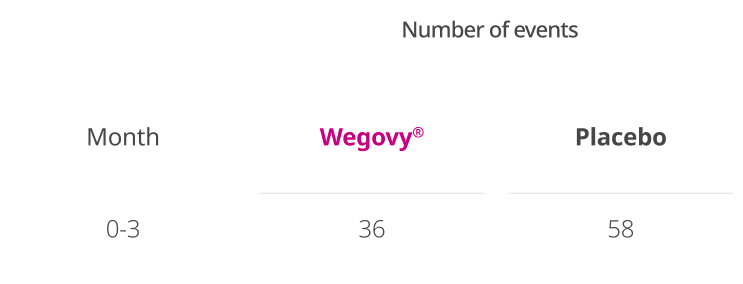
The exact mechanism of cardiovascular risk reduction has not been established.1
Clinically meaningful weight loss is generally defined as ≥5% weight loss from baseline.
In adults with established CVD and either obesity or overweight, without diabetes, when added to CV standard of care,
Patients taking Wegovy® sustained weight loss for up to 4 years
Change in mean body weight (%) from baseline through week 208 for all patients in trial
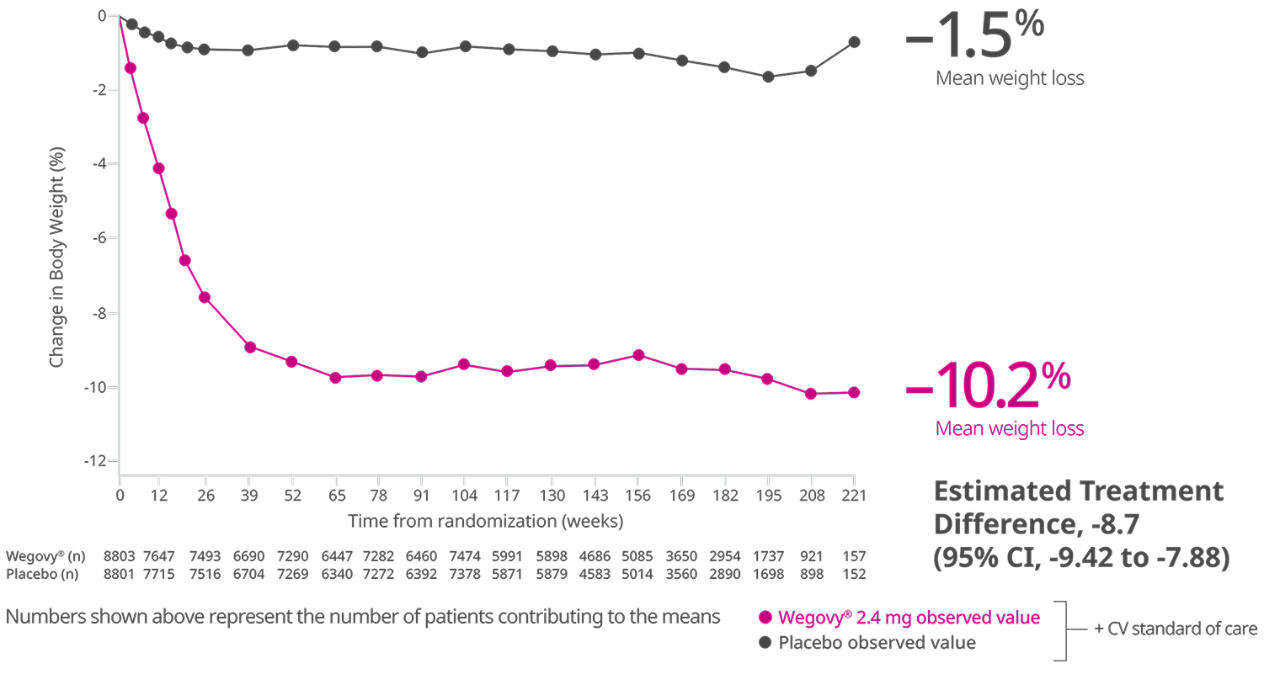
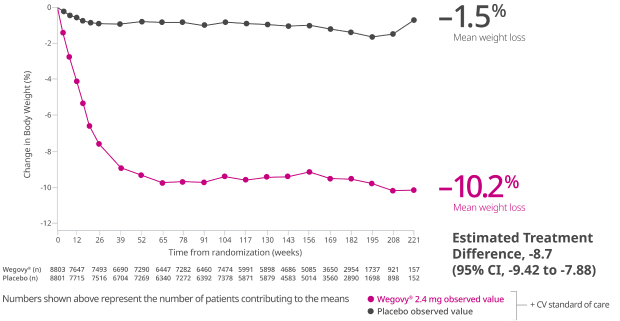
Post hoc analysis6:
- The results presented here are part of a prespecified, post hoc analysis from the SELECT trial
- This post hoc analysis examined change in body weight at 4 years from randomization. This analysis was not controlled for multiplicity and therefore results can only be viewed as hypothesis generating; the clinical validity of these results cannot be determined
- CV SOC in SELECT included medical management and individualized healthy lifestyle counseling without a focus on targeting weight loss
CI, confidence interval; CV, cardiovascular; CVD, cardiovascular disease; SOC, standard of care.
SCORE Real-World Data
Please first review the SELECT data before assessing the SCORE real-world data.
Randomized clinical trials (RCTs)
- Evaluate the safety and efficacy of a treatment in specific populations under controlled conditions
- Prospective designs with prespecified, well-defined inclusion/exclusion criteria, outcomes, and end points
- Patients are randomly assigned to treatment or comparator
Limitations:
- Tightly controlled conditions and inclusion/exclusion criteria of RCTs may limit generalizability to real-world conditions or clinical populations
- Can be expensive and time-consuming
Randomized clinical trials are designed to show causality7,8
Real-world observational studies
- Use data from routine clinical practice
- Capture outcomes across broad patient populations
- Offer insight into how treatments perform outside of a controlled clinical trial setting
- Should be viewed as complementary to clinical trial data
Limitations:
- Susceptible to bias and confounding due to factors such as lack of randomization, missing or duplicative data, coding inaccuracies, and data variability reflecting routine clinical practice
- The presence of a pharmacy claim does not necessarily reflect actual drug utilization by the patient
- The approval of Wegovy® in 2021 resulted in a relatively short duration of follow-up, limiting the assessment of long-term outcomes, and the COVID-19 pandemic may have impacted data
Real-world studies evaluate associations and cannot determine causality8,9
SCORE: The largest real-world CV outcomes study assessing the effectiveness of Wegovy® in adults with established CVD and overweight or obesity3¶
Study design
A retrospective, observational study of adults ≥45 years with overweight or obesity (BMI ≥27 kg/m2), and previous MI, ischemic stroke or PAD, without diabetes#
1:2 PS matching
Wegovy® users (n=9,321)
Non-users (n=18,642)
End point:
MACE-3 (CV death, non-fatal MI, non-fatal stroke**)
This study used the Komodo Research Dataset, which includes administrative medical and pharmacy claims linked with clinical and laboratory measurements for patients in the US during January 1, 2016-December 31, 2023.
SCORE mirrored the inclusion and exclusion criteria of the SELECT CVOT3:
This aligns to the study population of adults with established CVD and overweight or obesity
Selected baseline characteristics3
Age, years (mean)
BMI, kg/m2 (mean)††
ASCVD before index date
MI
Ischemic stroke
PAD
Non-users (n=18,642)
57.1
37.1
34.2%
30.1%
44.2%
Wegovy® users
(n=9,321)
56.8
37.3
34.1%
30.9%
44.6%
Index date definition: Wegovy® users: The initiation date of Wegovy® in a pharmacy claim on or after June 4, 2021.
Non-users: A randomly selected date with ≥1 pharmacy claim(s) on or after June 4, 2021.
Patients were followed until the earliest instance of the end of continuous enrollment or of data availability, the initiation of a (non-semaglutide) GLP-1 or GIP/GLP-1 receptor agonist, bariatric surgical procedure, or death.
¶As of March 24, 2025.
#Inclusion criteria and end points were identified by ICD-10 codes, procedural codes, or recorded measurements (BMI).
**CV death: Death within ≤30 days of a CV event.
††~65% of patients had an available BMI value; the remainder were identified by diagnosis codes for obesity/overweight.
ASCVD, atherosclerotic cardiovascular disease; GIP, glucose-dependent insulinotropic polypeptide; GLP-1, glucagon-like peptide-1; PS, propensity score.
In adults with established CVD and either obesity or overweight, without diabetes,
Wegovy® was associated with lower incidence of MACE in a real-world study3
Outcome: Time to first occurrence of MACE-3 (CV death, non-fatal MI, non-fatal stroke)
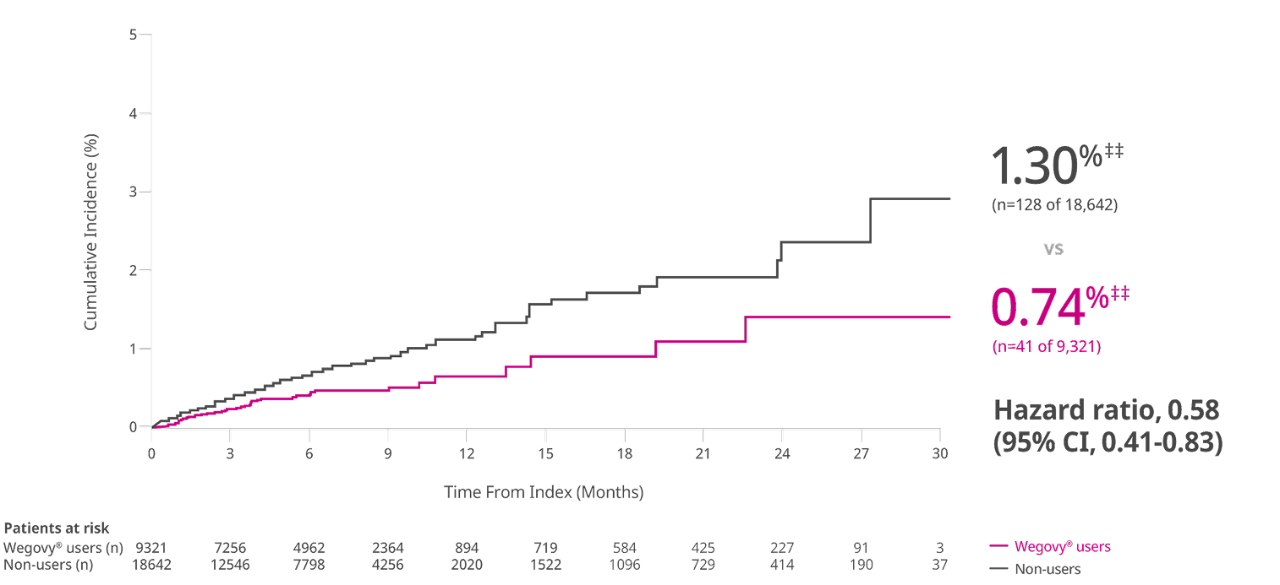
Results should be interpreted in the context of the limitations of this study.
In Wegovy® users vs non-users
42%
RRR of MACE§§
0.56%
ARRII II
Mean duration of follow-up: 7.1 months with Wegovy® users; 6.4 months with non-users
Limitations8: Despite robust PS matching, the potential of bias from unmeasured or residual confounding exists. Requiring 12 months of continuous enrollment before the index date may exclude patients with intermittent insurance coverage or those from underserved populations, limiting generalizability.
Study design
SCORE: A retrospective observational study using the Komodo Research Dataset (EHR linked to medical and pharmacy claims) of 27,963 US adults with a BMI ≥27 kg/m2 and established CVD (prior MI, prior stroke, or PAD) comparing the incidence of MACE-3 (CV death, non-fatal MI, or non-fatal stroke) in Wegovy® users vs non-users without diabetes. Full study period was from January 1, 2016, to December 31, 2023. Index date was defined as first Wegovy® claim or randomly selected pharmacy claim on or after June 4, 2021, for Wegovy® users and non-users, respectively. Baseline period was 12 months prior to the index date. Wegovy® users and non-users were matched using a non-parsimonious PS model to alleviate the effect of potential confounding on systematic differences in patient characteristics. Over 50 variables were matched, including age, gender, race/ ethnicity, region, insurance type, index year, duration between the eligibility date and index date, BMI, smoking history, comorbidities, procedures, medication use, and health care resource utilization.
End point:
- Time to first occurrence of MACE-3 (CV death, non-fatal MI, or non-fatal stroke)
‡‡Event rates per person-year: 41 events over 5,519 person-years for Wegovy® users, 128 events over 9,859 person-years for non-users.
§§The relative risk reduction is approximated by 1-hazard ratio.
II IIARR represents the difference in event rates per person-year in semaglutide users vs non-users.
EHR, electronic health record.
See long-term weight-management results
Get your patients started on Wegovy®
Important Safety Information for Wegovy®
WARNING: RISK OF THYROID C-CELL TUMORS
- In rodents, semaglutide causes dose-dependent and treatment-duration-dependent thyroid C-cell tumors at clinically relevant exposures. It is unknown whether Wegovy® causes thyroid C-cell tumors, including medullary thyroid carcinoma (MTC), in humans as human relevance of semaglutide-induced rodent thyroid C-cell tumors has not been determined
- Wegovy® is contraindicated in patients with a personal or family history of MTC or in patients with Multiple Endocrine Neoplasia syndrome type 2 (MEN 2). Counsel patients regarding the potential risk for MTC with the use of Wegovy® and inform them of symptoms of thyroid tumors (e.g. a mass in the neck, dysphagia, dyspnea, persistent hoarseness). Routine monitoring of serum calcitonin or using thyroid ultrasound is of uncertain value for early detection of MTC in patients treated with Wegovy®
Contraindications
- Wegovy® is contraindicated in patients with a personal or family history of MTC or in patients with MEN 2, and in patients with a prior serious hypersensitivity reaction to semaglutide or to any of the excipients in Wegovy®. Serious hypersensitivity reactions, including anaphylaxis and angioedema have been reported with Wegovy®
Warnings and Precautions
- Risk of Thyroid C-Cell Tumors: Patients should be further evaluated if serum calcitonin is measured and found to be elevated or thyroid nodules are noted on physical examination or neck imaging
- Acute Pancreatitis: Acute pancreatitis, including fatal and non-fatal hemorrhagic or necrotizing pancreatitis, has been observed in patients treated with GLP-1 receptor agonists, including Wegovy®. Observe patients carefully for signs and symptoms of acute pancreatitis (including persistent severe abdominal pain, sometimes radiating to the back, and which may or may not be accompanied by vomiting). If acute pancreatitis is suspected, discontinue Wegovy® and initiate appropriate management
- Acute Gallbladder Disease: Treatment with Wegovy® is associated with an increased occurrence of cholelithiasis and cholecystitis. The incidence of cholelithiasis and cholecystitis was higher in Wegovy® pediatric patients aged 12 years and older than in Wegovy® adults. In clinical trials in adult patients, cholelithiasis was reported by 1.6% of Wegovy® patients and 0.7% of placebo patients. Cholecystitis was reported by 0.6% of Wegovy® patients and 0.2% of placebo patients. In a clinical trial in pediatric patients aged 12 years and older, cholelithiasis was reported by 3.8% of Wegovy® patients and 0% placebo patients. Cholecystitis was reported by 0.8% of Wegovy® pediatric patients and 0% placebo patients. Substantial or rapid weight loss can increase the risk of cholelithiasis; however, the incidence of acute gallbladder disease was greater in Wegovy® patients than in placebo patients, even after accounting for the degree of weight loss. If cholelithiasis is suspected, gallbladder studies and appropriate clinical follow-up are indicated
- Hypoglycemia: Wegovy® lowers blood glucose and can cause hypoglycemia. In a trial of adult patients with type 2 diabetes, hypoglycemia was reported in 6.2% of Wegovy® patients versus 2.5% of placebo patients. Patients with diabetes taking Wegovy® with an insulin or insulin secretagogue (e.g. sulfonylurea) may have an increased risk of hypoglycemia, including severe hypoglycemia. The use of Wegovy® in patients with type 1 diabetes or in combination with insulin has not been evaluated. Inform patients of the risk of hypoglycemia and educate them on the signs and symptoms. Monitor blood glucose in patients with diabetes
- Acute Kidney Injury: There have been postmarketing reports of acute kidney injury and worsening of chronic renal failure, which in some cases required hemodialysis, in patients treated with semaglutide. Patients with renal impairment may be at a greater risk of acute kidney injury, but some events have been reported in patients without known underlying renal disease. A majority of the events occurred in patients who experienced nausea, vomiting, or diarrhea, leading to volume depletion. Monitor renal function when initiating or escalating doses of Wegovy® in patients reporting severe adverse gastrointestinal reactions and in patients with renal impairment reporting any adverse reactions that could lead to volume depletion
- Severe Gastrointestinal Adverse Reactions: Use of Wegovy® has been associated with gastrointestinal adverse reactions, sometimes severe. In clinical trials, severe gastrointestinal adverse reactions were reported more frequently among patients receiving Wegovy® (4.1%) than placebo (0.9%). Wegovy® is not recommended in patients with severe gastroparesis
- Hypersensitivity Reactions: Serious hypersensitivity reactions (e.g., anaphylaxis, angioedema) have been reported with Wegovy®. If hypersensitivity reactions occur, discontinue use of Wegovy®, treat promptly per standard of care, and monitor until signs and symptoms resolve. Use caution in a patient with a history of anaphylaxis or angioedema with another GLP-1 receptor agonist
- Diabetic Retinopathy Complications in Patients with Type 2 Diabetes: In a trial of adult patients with type 2 diabetes, diabetic retinopathy was reported by 4.0% of Wegovy® patients and 2.7% of placebo patients. Rapid improvement in glucose control has been associated with a temporary worsening of diabetic retinopathy. Patients with a history of diabetic retinopathy should be monitored for progression of diabetic retinopathy
- Heart Rate Increase: Mean increases in resting heart rate of 1 to 4 beats per minute (bpm) were observed in Wegovy® adult patients compared to placebo in clinical trials. More Wegovy® adult patients compared with placebo had maximum changes from baseline of 10 to 19 bpm (41% versus 34%) and 20 bpm or more (26% versus 16%). In a clinical trial in pediatric patients aged 12 years and older with normal baseline heart rate, more patients treated with Wegovy® compared to placebo had maximum changes in heart rate of 20 bpm or more (54% versus 39%). Monitor heart rate at regular intervals and instruct patients to report palpitations or feelings of a racing heartbeat while at rest. If patients experience a sustained increase in resting heart rate, discontinue Wegovy®
- Suicidal Behavior and Ideation: Suicidal behavior and ideation have been reported in clinical trials with other weight management products. Monitor patients for depression, suicidal thoughts or behavior, and/or any unusual changes in mood or behavior. Discontinue Wegovy® in patients who experience suicidal thoughts or behaviors and avoid in patients with a history of suicidal attempts or active suicidal ideation
- Pulmonary Aspiration During General Anesthesia or Deep Sedation: Wegovy® delays gastric emptying. There have been rare postmarketing reports of pulmonary aspiration in patients receiving GLP-1 receptor agonists undergoing elective surgeries or procedures requiring general anesthesia or deep sedation who had residual gastric contents despite reported adherence to preoperative fasting recommendations. Instruct patients to inform healthcare providers prior to any planned surgeries or procedures if they are taking Wegovy®
Adverse Reactions
- Most common adverse reactions (incidence ≥5%) are: nausea, diarrhea, vomiting, constipation, abdominal pain, headache, fatigue, dyspepsia, dizziness, abdominal distention, eructation, hypoglycemia in patients with type 2 diabetes, flatulence, gastroenteritis, gastroesophageal reflux disease, and nasopharyngitis
Drug Interactions
- The addition of Wegovy® in patients treated with insulin has not been evaluated. When initiating Wegovy®, consider reducing the dose of concomitantly administered insulin secretagogues (such as sulfonylureas) or insulin to reduce the risk of hypoglycemia
- Wegovy® causes a delay of gastric emptying and has the potential to impact the absorption of concomitantly administered oral medications. Monitor the effects of oral medications concomitantly administered with Wegovy®
Use in Specific Populations
- Pregnancy: May cause fetal harm. When pregnancy is recognized, discontinue Wegovy®. Discontinue Wegovy® in patients at least 2 months before a planned pregnancy
- Pediatric: Adverse reactions with Wegovy® in pediatric patients aged 12 years and older were similar to those reported in adults. Pediatric patients ≥12 years of age treated with Wegovy® had greater incidences of cholelithiasis, cholecystitis, hypotension, rash, and urticaria compared to adults treated with Wegovy®. There are insufficient data in pediatric patients with type 2 diabetes treated with Wegovy® for obesity to determine if there is an increased risk of hypoglycemia with Wegovy® treatment similar to that reported in adults
- Geriatric: In the cardiovascular outcomes trial, patients aged 75 years and older reported more hip and pelvis fractures on Wegovy® than placebo. Patients aged 75 years and older (Wegovy® and placebo) reported more serious adverse reactions overall compared to younger adult patients
Please click here for Wegovy® Prescribing Information, including Boxed Warning.
Indications and Usage
Wegovy® (semaglutide) injection 2.4 mg is indicated in combination with a reduced calorie diet and increased physical activity:
- to reduce the risk of major adverse cardiovascular events (cardiovascular death, non-fatal myocardial infarction, or non-fatal stroke) in adults with established cardiovascular disease and either obesity or overweight
- to reduce excess body weight and maintain weight reduction long term in adults and pediatric patients aged 12 years and older with obesity and adults with overweight in the presence of at least one weight-related comorbidity
Limitations of Use:
Wegovy® contains semaglutide. Coadministration with other semaglutide-containing products or with any GLP-1 receptor agonist is not recommended
Important Safety Information for Wegovy®
WARNING: RISK OF THYROID C-CELL TUMORS
- In rodents, semaglutide causes dose-dependent and treatment-duration-dependent thyroid C-cell tumors at clinically relevant exposures. It is unknown whether Wegovy® causes thyroid C-cell tumors, including medullary thyroid carcinoma (MTC), in humans as human relevance of semaglutide-induced rodent thyroid C-cell tumors has not been determined
- Wegovy® is contraindicated in patients with a personal or family history of MTC or in patients with Multiple Endocrine Neoplasia syndrome type 2 (MEN 2). Counsel patients regarding the potential risk for MTC with the use of Wegovy® and inform them of symptoms of thyroid tumors (e.g. a mass in the neck, dysphagia, dyspnea, persistent hoarseness). Routine monitoring of serum calcitonin or using thyroid ultrasound is of uncertain value for early detection of MTC in patients treated with Wegovy®
Important Safety Information for Wegovy®
WARNING: RISK OF THYROID C-CELL TUMORS
- In rodents, semaglutide causes dose-dependent and treatment-duration-dependent thyroid C-cell tumors at clinically relevant exposures. It is unknown whether Wegovy® causes thyroid C-cell tumors, including medullary thyroid carcinoma (MTC), in humans as human relevance of semaglutide-induced rodent thyroid C-cell tumors has not been determined
- Wegovy® is contraindicated in patients with a personal or family history of MTC or in patients with Multiple Endocrine Neoplasia syndrome type 2 (MEN 2). Counsel patients regarding the potential risk for MTC with the use of Wegovy® and inform them of symptoms of thyroid tumors (e.g. a mass in the neck, dysphagia, dyspnea, persistent hoarseness). Routine monitoring of serum calcitonin or using thyroid ultrasound is of uncertain value for early detection of MTC in patients treated with Wegovy®
Contraindications
- Wegovy® is contraindicated in patients with a personal or family history of MTC or in patients with MEN 2, and in patients with a prior serious hypersensitivity reaction to semaglutide or to any of the excipients in Wegovy®. Serious hypersensitivity reactions, including anaphylaxis and angioedema have been reported with Wegovy®
Warnings and Precautions
- Risk of Thyroid C-Cell Tumors: Patients should be further evaluated if serum calcitonin is measured and found to be elevated or thyroid nodules are noted on physical examination or neck imaging
- Acute Pancreatitis: Acute pancreatitis, including fatal and non-fatal hemorrhagic or necrotizing pancreatitis, has been observed in patients treated with GLP-1 receptor agonists, including Wegovy®. Observe patients carefully for signs and symptoms of acute pancreatitis (including persistent severe abdominal pain, sometimes radiating to the back, and which may or may not be accompanied by vomiting). If acute pancreatitis is suspected, discontinue Wegovy® and initiate appropriate management
- Acute Gallbladder Disease: Treatment with Wegovy® is associated with an increased occurrence of cholelithiasis and cholecystitis. The incidence of cholelithiasis and cholecystitis was higher in Wegovy® pediatric patients aged 12 years and older than in Wegovy® adults. In clinical trials in adult patients, cholelithiasis was reported by 1.6% of Wegovy® patients and 0.7% of placebo patients. Cholecystitis was reported by 0.6% of Wegovy® patients and 0.2% of placebo patients. In a clinical trial in pediatric patients aged 12 years and older, cholelithiasis was reported by 3.8% of Wegovy® patients and 0% placebo patients. Cholecystitis was reported by 0.8% of Wegovy® pediatric patients and 0% placebo patients. Substantial or rapid weight loss can increase the risk of cholelithiasis; however, the incidence of acute gallbladder disease was greater in Wegovy® patients than in placebo patients, even after accounting for the degree of weight loss. If cholelithiasis is suspected, gallbladder studies and appropriate clinical follow-up are indicated
- Hypoglycemia: Wegovy® lowers blood glucose and can cause hypoglycemia. In a trial of adult patients with type 2 diabetes, hypoglycemia was reported in 6.2% of Wegovy® patients versus 2.5% of placebo patients. Patients with diabetes taking Wegovy® with an insulin or insulin secretagogue (e.g. sulfonylurea) may have an increased risk of hypoglycemia, including severe hypoglycemia. The use of Wegovy® in patients with type 1 diabetes or in combination with insulin has not been evaluated. Inform patients of the risk of hypoglycemia and educate them on the signs and symptoms. Monitor blood glucose in patients with diabetes
- Acute Kidney Injury: There have been postmarketing reports of acute kidney injury and worsening of chronic renal failure, which in some cases required hemodialysis, in patients treated with semaglutide. Patients with renal impairment may be at a greater risk of acute kidney injury, but some events have been reported in patients without known underlying renal disease. A majority of the events occurred in patients who experienced nausea, vomiting, or diarrhea, leading to volume depletion. Monitor renal function when initiating or escalating doses of Wegovy® in patients reporting severe adverse gastrointestinal reactions and in patients with renal impairment reporting any adverse reactions that could lead to volume depletion
- Severe Gastrointestinal Adverse Reactions: Use of Wegovy® has been associated with gastrointestinal adverse reactions, sometimes severe. In clinical trials, severe gastrointestinal adverse reactions were reported more frequently among patients receiving Wegovy® (4.1%) than placebo (0.9%). Wegovy® is not recommended in patients with severe gastroparesis
- Hypersensitivity Reactions: Serious hypersensitivity reactions (e.g., anaphylaxis, angioedema) have been reported with Wegovy®. If hypersensitivity reactions occur, discontinue use of Wegovy®, treat promptly per standard of care, and monitor until signs and symptoms resolve. Use caution in a patient with a history of anaphylaxis or angioedema with another GLP-1 receptor agonist
- Diabetic Retinopathy Complications in Patients with Type 2 Diabetes: In a trial of adult patients with type 2 diabetes, diabetic retinopathy was reported by 4.0% of Wegovy® patients and 2.7% of placebo patients. Rapid improvement in glucose control has been associated with a temporary worsening of diabetic retinopathy. Patients with a history of diabetic retinopathy should be monitored for progression of diabetic retinopathy
- Heart Rate Increase: Mean increases in resting heart rate of 1 to 4 beats per minute (bpm) were observed in Wegovy® adult patients compared to placebo in clinical trials. More Wegovy® adult patients compared with placebo had maximum changes from baseline of 10 to 19 bpm (41% versus 34%) and 20 bpm or more (26% versus 16%). In a clinical trial in pediatric patients aged 12 years and older with normal baseline heart rate, more patients treated with Wegovy® compared to placebo had maximum changes in heart rate of 20 bpm or more (54% versus 39%). Monitor heart rate at regular intervals and instruct patients to report palpitations or feelings of a racing heartbeat while at rest. If patients experience a sustained increase in resting heart rate, discontinue Wegovy®
- Suicidal Behavior and Ideation: Suicidal behavior and ideation have been reported in clinical trials with other weight management products. Monitor patients for depression, suicidal thoughts or behavior, and/or any unusual changes in mood or behavior. Discontinue Wegovy® in patients who experience suicidal thoughts or behaviors and avoid in patients with a history of suicidal attempts or active suicidal ideation
- Pulmonary Aspiration During General Anesthesia or Deep Sedation: Wegovy® delays gastric emptying. There have been rare postmarketing reports of pulmonary aspiration in patients receiving GLP-1 receptor agonists undergoing elective surgeries or procedures requiring general anesthesia or deep sedation who had residual gastric contents despite reported adherence to preoperative fasting recommendations. Instruct patients to inform healthcare providers prior to any planned surgeries or procedures if they are taking Wegovy®
Adverse Reactions
- Most common adverse reactions (incidence ≥5%) are: nausea, diarrhea, vomiting, constipation, abdominal pain, headache, fatigue, dyspepsia, dizziness, abdominal distention, eructation, hypoglycemia in patients with type 2 diabetes, flatulence, gastroenteritis, gastroesophageal reflux disease, and nasopharyngitis
Drug Interactions
- The addition of Wegovy® in patients treated with insulin has not been evaluated. When initiating Wegovy®, consider reducing the dose of concomitantly administered insulin secretagogues (such as sulfonylureas) or insulin to reduce the risk of hypoglycemia
- Wegovy® causes a delay of gastric emptying and has the potential to impact the absorption of concomitantly administered oral medications. Monitor the effects of oral medications concomitantly administered with Wegovy®
Use in Specific Populations
- Pregnancy: May cause fetal harm. When pregnancy is recognized, discontinue Wegovy®. Discontinue Wegovy® in patients at least 2 months before a planned pregnancy
- Pediatric: Adverse reactions with Wegovy® in pediatric patients aged 12 years and older were similar to those reported in adults. Pediatric patients ≥12 years of age treated with Wegovy® had greater incidences of cholelithiasis, cholecystitis, hypotension, rash, and urticaria compared to adults treated with Wegovy®. There are insufficient data in pediatric patients with type 2 diabetes treated with Wegovy® for obesity to determine if there is an increased risk of hypoglycemia with Wegovy® treatment similar to that reported in adults
- Geriatric: In the cardiovascular outcomes trial, patients aged 75 years and older reported more hip and pelvis fractures on Wegovy® than placebo. Patients aged 75 years and older (Wegovy® and placebo) reported more serious adverse reactions overall compared to younger adult patients
Please click here for Wegovy® Prescribing Information, including Boxed Warning.
Indications and Usage
Wegovy® (semaglutide) injection 2.4 mg is indicated in combination with a reduced calorie diet and increased physical activity:
- to reduce the risk of major adverse cardiovascular events (cardiovascular death, non-fatal myocardial infarction, or non-fatal stroke) in adults with established cardiovascular disease and either obesity or overweight
- to reduce excess body weight and maintain weight reduction long term in adults and pediatric patients aged 12 years and older with obesity and adults with overweight in the presence of at least one weight-related comorbidity
Limitations of Use:
Wegovy® contains semaglutide. Coadministration with other semaglutide-containing products or with any GLP-1 receptor agonist is not recommended
References
1. Wegovy® [package insert]. Plainsboro, NJ: Novo Nordisk Inc.
2. Lincoff AM, Brown-Frandsen K, Colhoun HM, et al. Semaglutide and cardiovascular outcomes in obesity without diabetes. N Engl J Med. 2023;389(24):2221-2232.
3. Data on file. Novo Nordisk Inc.; Plainsboro, NJ.
4. FDA approves first treatment to reduce risk of serious heart problems specifically in adults with obesity or overweight. FDA. Published March 8, 2024. Accessed June 4, 2025. https://www.fda.gov/news-events/press-announcements/fda-approves-first-treatment-reduce-risk-serious-heart-problems-specifically-adults-obesity-or
5. Khafagy R, Dash S. Obesity and cardiovascular disease: the emerging role of inflammation. Front Cardiovasc Med. 2021;8:768119.
6. Ryan DH, Lingvay I, Deanfield J, et al. Long-term weight loss effects of semaglutide in obesity without diabetes in the SELECT trial. Nat Med. 2024;30(7):2049-2057.
7. Zabor EC, Kaizer AM, Hobbs BP. Randomized controlled trials. Chest. 2020;158(1S):S79-S87.
8. Sheldrick RC. Randomized trials vs real-world evidence: how can both inform decision-making? JAMA. 2023;329(16):1352-1353.
9. Dang A. Real-world evidence: a primer. Pharmaceut Med. 2023;37(1):25-36.